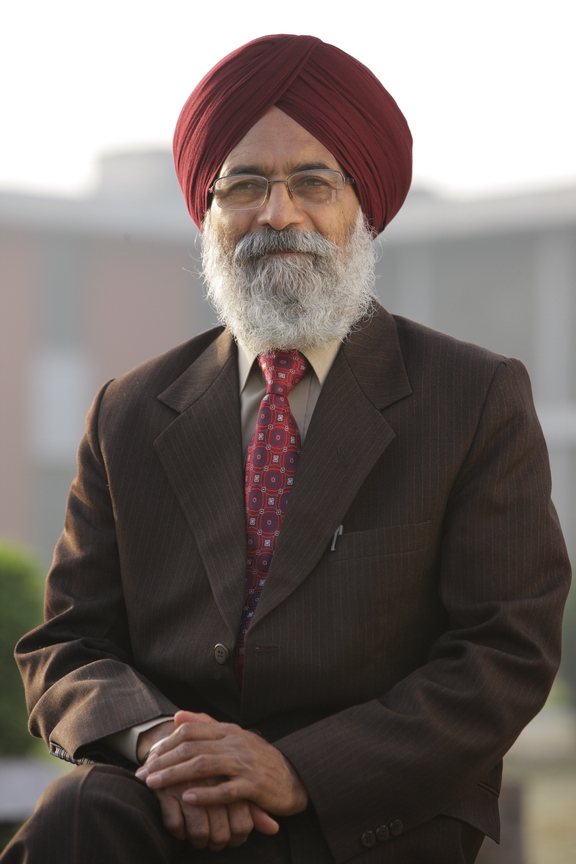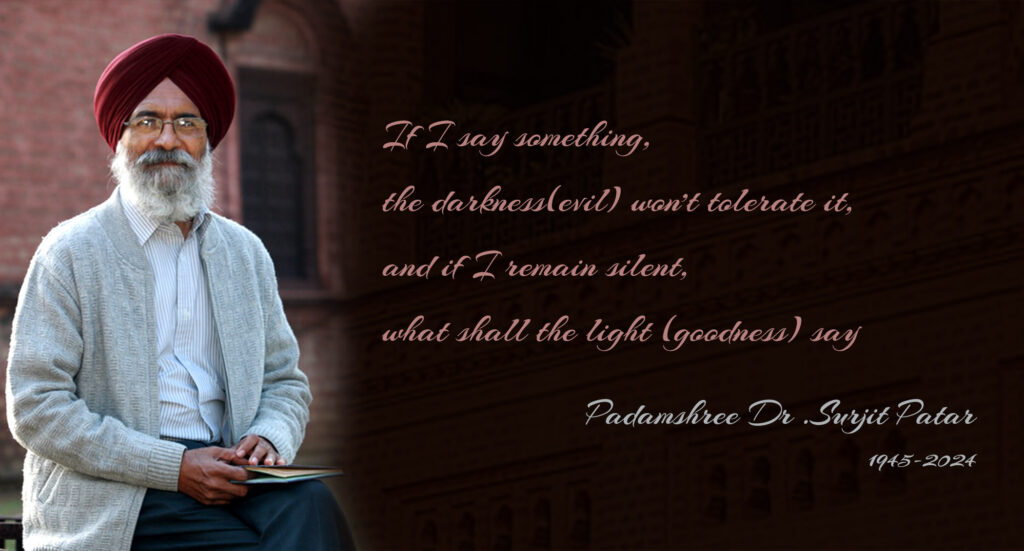On May 11, 2024, eminent Punjabi poet, Surjit Patar breathed his last in his sleep in Ludhiana, Punjab. At the age of 79, his passing brought down curtains on the pen that had woven words in poetry to bring out the magic and mesmerize countless readers.

True to his poem:
Main rahan te nahin turda, main turda haan tan raah bande ne
Yugan ton kafle aaunde, ise sach de gwaah bande
(I don’t walk on the roads, I walk and then the roads are created. Since ages, caravans have witnessed this truth)
Patar had created inroads into the literary world creating pieces of literary art that have covered a wide spectrum of issues, right from societal norms to human emotions.
An eminent theatre person, a playwright and a musician, Patar had adorned many hats with equal poise and elegance. Born and brought up in the village of Pattar Kalan in Jalandhar district, he completed his undergraduate studies at Randhir College in Kapurthala, followed by a master’s degree from Punjabi University in Patiala.
After completing his doctorate on ‘The evolution of folklore in Guru Nanak Vani’ at Guru Nanak Dev University, Amritsar, he stepped into the shoes of a teacher at Punjab Agricultural University, Ludhiana, and worked for over three decades.
Patar’s pen cried for undivided Punjab with his Odon Waris Shah Nun Vandya Si, touched the contours of an ailing justice system, bled with the militancy in Punjab through Laggi Nazar Punjab Nu and spoke about the unspoken through “Kuchh keha taan hanera jarega kiven, Chup reha taan shamadaan ki kehenge” (How will the darkness endure if I say something? If I remained silent, what will the candelabrum say?
Not only was he a literary figure, but he also raised notes of dissent, albeit in a different way. In 2015, he returned his Sahitya Akademi honour protesting a series of targeted killings of rationalists like Gauri Lankesh, and MM Kalburgi and communal attacks on minorities. Then again in 2020, Patar returned his Padma Shri in support of farmers protesting against the farm laws at the borders of Delhi.
Patar is credited with translations of some of the finest literary works best like Federico Garcia Lorca’s Three Tragedies, Girish Karnad’s Nagamandala and poems by Brecht and Pablo Neruda in the Punjabi language. He also adapted plays by Jean Giraudoux, Euripides and Racine along with tele-scripts featuring Punjabi poets from Sheikh Farid to Shiv Kumar Batalvi. Throughout his vast poetic career, he won a plethora of awards that acknowledged his contribution to Punjabi literature.
| Awards | Year |
| Punjab Sahitya Akademi Award | 1979 |
| Sahitya Akademi Award | 1993 |
| Panchnad Puruskar by Bhartiya Bhasha Parishad, Kolkata | 1999 |
| Saraswati Samman by KK Birla Foundation | 2009 |
| Gangadhar National Award for Poetry, Sambalpur University, Orissa | 2009 |
| Padma Shri Award in the field of Literature and Education (fourth highest civilian award of the country) | 2012 |
| Kusumagraj Literary Award | 2014 |
| Waris Shah International Award | 2022 |
His son Manraj Patar revealed that Surjit Patar’s first true love was not writing. He loved singing and often played harmonium, guitar and tumbi. He was fascinated with music from a very young age. But the family circumstances molded him into a litterateur and the rest is history.
The Patar family now plans to set up the Surjit Patar Foundation which would work to promote Punjabi literature. The Foundation plans to hold annual literary and music festivals and awards ceremonies to acknowledge and celebrate the work of talented writers on his birth anniversary, January 14, every year.
Manraj added that the family will commence with the launch of the foundation’s website named ‘Surjit Patar Foundation’. The website shall be a repository for his works and that of his family.
The man who inspired dreams of millions, on May 11, 2024, just hours before passing away, sang his poem at a literary programme at Barnala, Punjab.
The lines were:
Haner na samjhe ki chanan darr gya hai,
Raat na soche ki suraj mar gaya hai,
(People light candles to make darkness stay away, when it’s night it doesn’t mean the Sun will not return)

Edited By Aaryanshi Mohan
